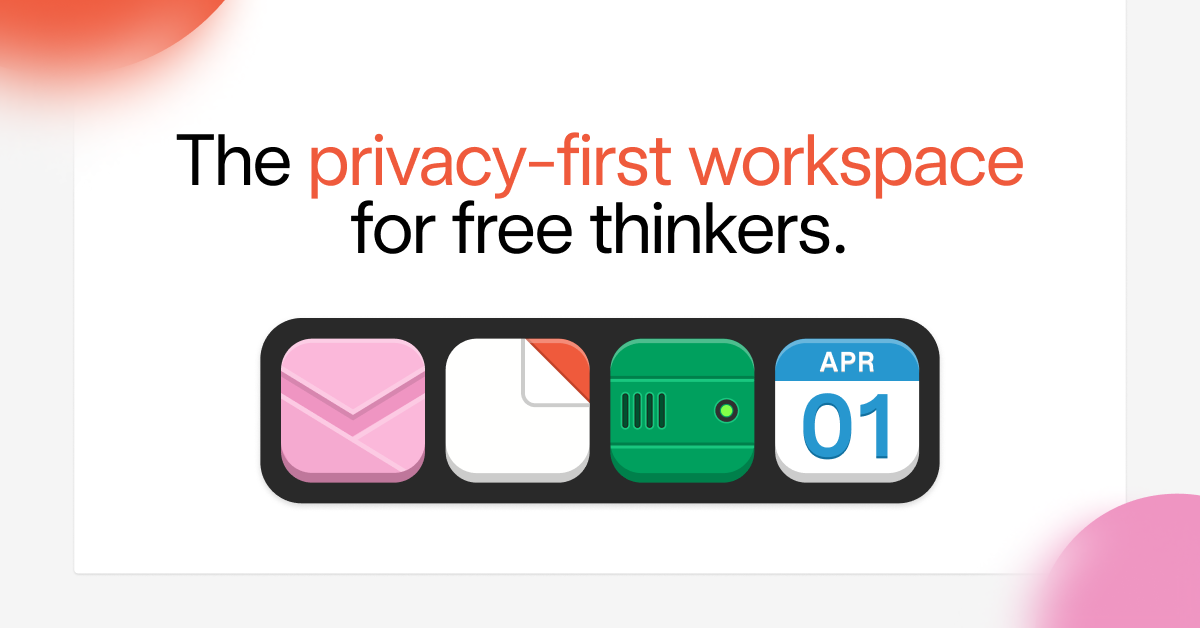why did notion buy it? to shut it down?
They’ve just done the same with a calendar app that I forget the name of. They then rereleased it under their own brand.
They appear to be on an unspoken mission to challenge Google’s suite of apps, so I’d hazard a guess that email tech is a part of that puzzle (along with calendar)
Cron. They didn’t shut it down though, they just suddenly transitioned it. I’d just started using Cron when they did it and it was very unexpected for me.
I mean that sounds pretty reasonable, could they just not think of a name that wasn’t already in prevalent use? Was the goal to be unsearchable for anyone trying to find it?
That’s like creating a reminders app and naming it task manager.
They renamed it Notion calendar, but Cron had pretty solid SEO. I much preferred its old name and theme.
Well that’s great for them, but that also means that people searching for the cron that has had that name for 50 years are going to get irrelevant results for a calendar app.
I seriously doubt people looking for cron are going to be confused by a calendar app.
Help guys, every time I go to look up the mail command, the fucking USPS shows up.
The command line cron is used for scheduling tasks, so it seems reasonable that the search results could get muddled.
Or a spreadsheet program and calling it Excel.
Or outlook, access…
The name doesn’t matter if you can establish it.
Their point isn’t that it’s a weird name that isn’t descriptive of what the product does, their point is that cron is an already existing bit of software that does something else.
It’d be like if MS made a notes app called Steam, Google called a new camera app iTunes, or Apple rebranded Apple Music to PowerShell.
Minus the trademark infringement I guess. I doubt Cron has that.
Even worse is that it’s close enough.
Like “recur by specific days but not by months cron”
Is a valid search for both things. Only one came out in 1975 and has had that name forever, and one decided it would be cool to hijack it
That’s the one, and you’re right, it is currently a rebrand but ultimately the same product.
I think having separate apps is the wrong way to go for their “integrate everything in one place” philosophy, over the longer term. I’m eager to see what they do with it next.
There mission must be copying Google killing perfectly good products.
Most likely with the goal of getting acquired by Google or MS or something. Exit strategies eating exit strategies
Yes! Also because capitalism is the bestest, most innovative economic system ever!
Perhaps interested in the people working there and wanting to create their own email service from the ground up?
Their generous offering of 10gigabytes of free storage along with a private, ad-free, end-to-end encrypted experience always sounded too good to be true. There was no way they could sustain that business model long term. At least they’re giving users enough time to jump ship and have not sold their data to Notion (judging by their twitter replies).
There is a not-insignificant amount of start ups and small projects out there looking to hook the privacy-minded crowd seeking smaller, independent replacements for Microsoft /Google/Apple’s various services and suites.
And that’s good in the sense there’s more options, but some of them (not all, but some) don’t seem to be from people that truly believe in their product and intend to maintain it long term, they just want to get enough users to get acquired.
Stage 1 is done. Stage 2 is beginning:
now here’s how a platform dies. first it’s good to its users. then it abuses those users to make things better for business customers.
Here is an alternative Piped link(s):
https://piped.video/rimtaSgGz_4?t=128
Piped is a privacy-respecting open-source alternative frontend to YouTube.
I’m open-source; check me out at GitHub.
Is there a database tracking companies that start out with good intentions and then eventually gets bought out or sells out their initial values? I’m wondering what the deciding factors are, and how long it takes for them to turn.
good intentions
I’m sorry to tell you that nearly every startup today begins with an exit strategy from the start. The founders of skiff were probably waiting for the right number of zeros in this case
Not a db, I just want to share one reason that happened to the startup I was working at.
The owners were thinking about keep business as usually which means paying more to the employees or scaling up which is very expensive, they only had small to medium sized companies as their customers(but many). Then this big company came from a different country, they were on a shopping spree buying a lot of companies(scaling up and taking over the market). The owners of the company I worked at were soon 65 or above 65 so they thought that it was a opportunity. Because if they sell then they don’t have to be worried about money after retirement. So they did. But they did think the company would be taken care of, but I think they also looked away from the bad stuff, wishing this would be great. Almost everyone left the company after a year or two (myself included), it was a sinking ship. Same goes for the other companies they acquired.
Tldr; selling the company to get retirement money while hoping the company will be taken cared of. Took only a year for ppl to leave because of how bad it was.
Not a db but https://ourincrediblejourney.tumblr.com/
deleted by creator
Imagine a future where every home user can run a FreedomBox or something similar with decentralized services like email with your own custom email domain, XMPP and more. No more exploitation by commercial companies.
🌞
It’s a nice thought but if everyone were to manage their own email server (and other things) we would have SO much more security problems in general.
I spend a not insignificant amount of my work week now dealing with quarantined or bounced mail from other companies that can’t or won’t set up DKIM, SPF, and DMAC properly. Not individuals, companies, with IT departments.
You’ll never get most people to properly manage their own email server.
Prolly cause their I.T. is Ian Trevor, a guy who knows how to boot up the mail server box.
This is true.
And it’s a problem with email itself lacking a native security infrastructure.
I don’t know what the answer is - maybe less reliance on email? But then it would have to be supplanted by something else.
Seems like we’re still in the developing phase of all this stuff.
Email grew during a time when connectivity was sporadic. I’ll check my email when I get connected. So store-and-forward.
We still need the store-and-forward capability, but we now rely on instant delivery.
Then there’s the conversation vs letter idea, files/attachments, etc.
Corporate systems try to combine it all, which makes sense. No reason to move files about, instead have a repository and send coworkers links to the files since we’re all part of the same infrastructure (it’s a database after all).
If we look more abstractly at the major functions people use, there’s largely messages (ad-hoc, one-off), conversations (something like messages, with group management, longer-term chains, etc), data sharing (files, images, video, preferably links so people retrieve as needed), meta-data (say contact info, business info, location data, etc), and who’s know what else I’m missing. Designing system/s to manage all this while being extensible seems the big challenge.
To go full circle on this, even if everyone self-hosted this same repository/messaging platform, we’d need some kind of federation capability, with security and trust management.
It would be interesting to see any research on this from Microsoft (and other groups, universities, FB etc) - their R&D org really knows their stuff. I’d like to see the high-level, abstract, major categories of elements.
Look at systems like QNAP that allow you to host cloud features from your home. Email or text a link to your file hosted on your NAS! Photo sharing features. Very nice! That said, constant security issues. Now your NAS is pwned.
That said, constant security issues. Now your NAS is pwned.
Yeah, not a good time when your NAS gets ransomware attacked beacuse the company who makes it has shit security practices. Build your own with TrueNAS or Unraid who at least have motivation to keep their software secure.
Oh, you can do something like this today, but not with a mature, security-focused, federated product.
I’m kind of building something like this for friends/family, but it won’t be generally exposed to the world, it’ll be isolated on a VLAN, with no access to my home net. And it’ll have a secure front end accessible only via a VPN.
Not something for the average person to do.
That used to be a thing until everyone started drooling over cloud based services, which I never trusted but time marches on and services for the masses are much needed.
Is FreedomBox made by Bluesky?
FreedomBox exists since years. Maybe BlueSky social copied the FreedomBox logo :(
>free thinkers
Lol. Lmao even.
deleted by creator
I’ve seen this happen far too many times.
Acquired/Acqui-hired
Examples: GeoCities, Posterous, Brace.io, Roon, Viddy, Qwiki, Yahoo! Voices, Blip.tv, Giphy
Situation: Company A buys Company B, employees and all. Together, they will continue their incredible journey to make the world a better place. A few months/years/seconds later, Company B is dead and its employees are either laid off or reassigned to Company A projects.
https://wiki.archiveteam.org/index.php/A_Million_Ways_to_Die_on_the_Web
I’ve worked at companies like this. Company B might actually be turning a good profit and benefiting millions of users in a charitable space, but it would look bad on the books to sell it, and it lowers the value of the company overall to keep it.
Belligerent toilet capitalism.
I never really trusted them. Now I know why.
This sort of thing is why I went with an established, for-pay email provider (fastmail). I mean, they might still sell out if someone made them an attractive enough offer, but they’re not looking for offers the way a recent startup would be, and it’s obvious where they get the cashflow to sustain the business from.
I used Notion for managing my D&D campaign until I noticed I was approaching the limitations of what the free tier offered. That sent me looking for an alternative and I ended up settling on Skiff Pages (at that time I don’t even think they had email, drive, etc). It didn’t have all the features that Notion did, but it was functional, easy to use, and they were frequently adding improvements.
It’s kind of funny to me that they ended up getting swallowed by Notion in the end. I’m just glad that I’ve long since switched over to Obsidian. My Markdown files can’t get bought by Notion . 😂
How much for your markdown files?
+1 for obsidian! Have you tried out text generator plugin? Uses GPT api’s. Haven’t gotten into D&D but seems like it’d be a great tool for DMs to help make content.
Oh, that sounds really cool!! I haven’t actually used chatGPT so I’m not familiar with the pricing or free limitations of it.
Recently I’ve been really enjoying LM studio for D&D related things. I’ve created separate conversation threads for different topics, plots, and characters. So, when I ask a question it already is aware of the context behind my ask and it tailors the response accordingly.
For example, I recently had a one-shot and I knew I wanted to have a powerful sorceress who controlled minds. So I spun up a new conversation and typed out the basic info. Then I asked the LLM what her favorite form of torture was, how many people she had mind controlled, and what her lair might look like, etc. It worked better than I thought it would, although some of the responses seemed pretty cookie cutter 😅
deleted by creator
The enshit intensifies
We need banks that specifically are meant to allow the workers of a company to buy their company and turn it into a collective. Not that the workers can sell the shares but they own it in the sense that they can democratically determine how profits are spend and what managers are hired / elected. Just a loan which just requires printing a little more money which we do all the time.
That would solve so many inefficiencies and amoralities in the current economy.
Big fish eat the little ones, big fish eat the little ones
Not my problem give me some…
Used it for a little bit. Seemed really nice, but it was quite janky so I backed out and went back to Mailbox. Feel like I dodged a bullet.
Dang. Is Proton the most reliable alternative when deGoogling, then? Skiff looked promising, aside from having kind of a dumb name.















